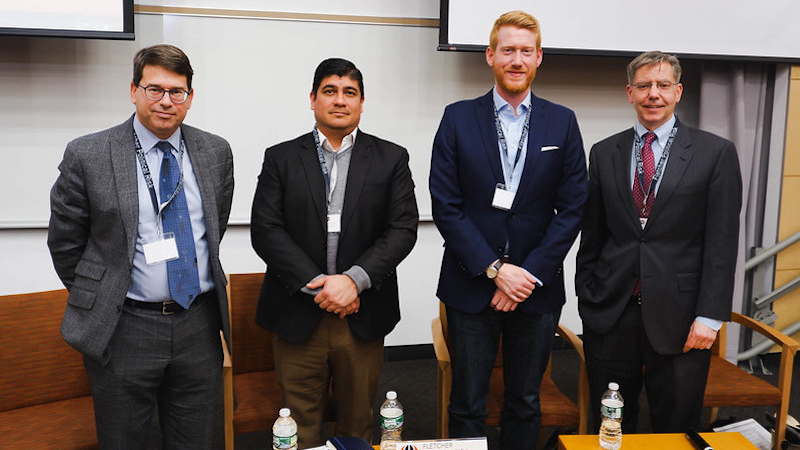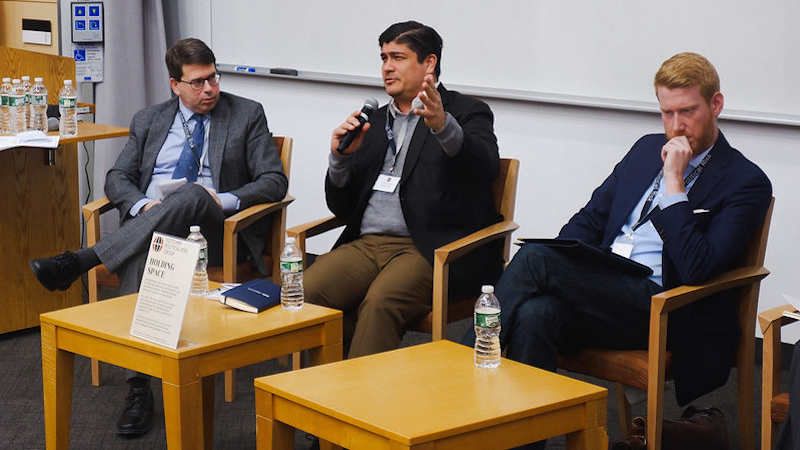
Fletcher Political Risk Conference Hosts a Panel Discussion on Shifts in Global Power
By Hannah Campeanu, MALD 2024 Candidate, The Fletcher School
On March 10, 2023, the Fletcher Russia and Eurasia program sponsored a panel on “Distribution of Powers in the World Today” as part of the Fletcher Political Risk Conference. Organized by the Fletcher Political Risk Group, the two-day student-run conference was on the theme, “The Great Transition: An Attempted Shift Towards Autonomy,” and featured insightful analyses from industry professionals.
The “Distribution of Powers in the World Today” discussion was moderated by Professor Daniel Drezner, the co-director of the Russia and Eurasia Program. The panelists included Claire Kaiser, head of strategy at McLarty Associates; Carlos Alvarado Quesada, former president of Costa Rica and professor at The Fletcher School; Graeme Thompson, senior analyst at the Eurasia Group; and Jonathan Brookfield, professor at The Fletcher School.
Professor Drezner framed the discussion in terms of the shifts in power occurring in the world today, such as the decreasing effectiveness of military power and the changing balance between man and nature.
Claire Kaiser opened by describing some other current shifts in power, like the recent failures of nuclear arms control, the rising importance of data, and the growing race for critical metals. She addressed how Russia’s war in Ukraine has changed the global risk environment from a commercial perspective, noting that Russia’s power will continue to decrease as the war continues.

Kaiser explained, “As the war goes on and as the economic dimension becomes clear between China and Russia, Russia will look more and more like China’s Belarus, to put it in terms Russia would be familiar with. Needless to say, I don’t think that’s a position Russia would necessarily want to be in, but that’s the reality.”
Carlos Alvarado Quesada then spoke on shifts in power in relation to Latin America, naming crime, democracy, governance, social unrest, and migration as some of the political risks of most concern in the region. He observed that there has been lots of rhetoric on these subjects but not adequate policymaking, either from the United States towards the region or vice versa. He also discussed the “mixed signals” sent by U.S. economic and migration policies, the concept of the world becoming regionalized rather than globalized, and Latin America’s response to a rising China.
He explained, “Any country in Latin America cannot ignore China. Most countries don’t want to pick sides, they just want to be better off. They don’t want to be forced to pick sides, but also you like good offers, you like good opportunities.”
Graeme Thompson added a few more shifts in power to the conversation for consideration, including the shift of the classical balance of power that has occurred since the end of the Cold War, the rise of new economic powerhouses like China and India, and the historical reconvergence between developed West and the rest of the world. He also hypothesized that we have moved into a technopolar world in which technological power can shift geopolitical power.
Finally, Professor Jonathan Brookfield spoke about shifts in power within China itself. He noted that institutional norms have become less important under Xi Jinping, with centralization of power taking its place. He observed that this makes the country less predictable in some ways, although Xi has become a source of continuity as an individual dominating the system.
The panelists moved on into an animated exchange of questions, debating whether scaremongering and exaggeration is part of the nature of discussions of political risk, and whether China will be able to continue its geopolitical rise with an aging populace and shrinking workforce. The event concluded with questions from the audience, which included students and guests from the Fletcher School, the Foreign Policy Research Institute, and Harvard University.

